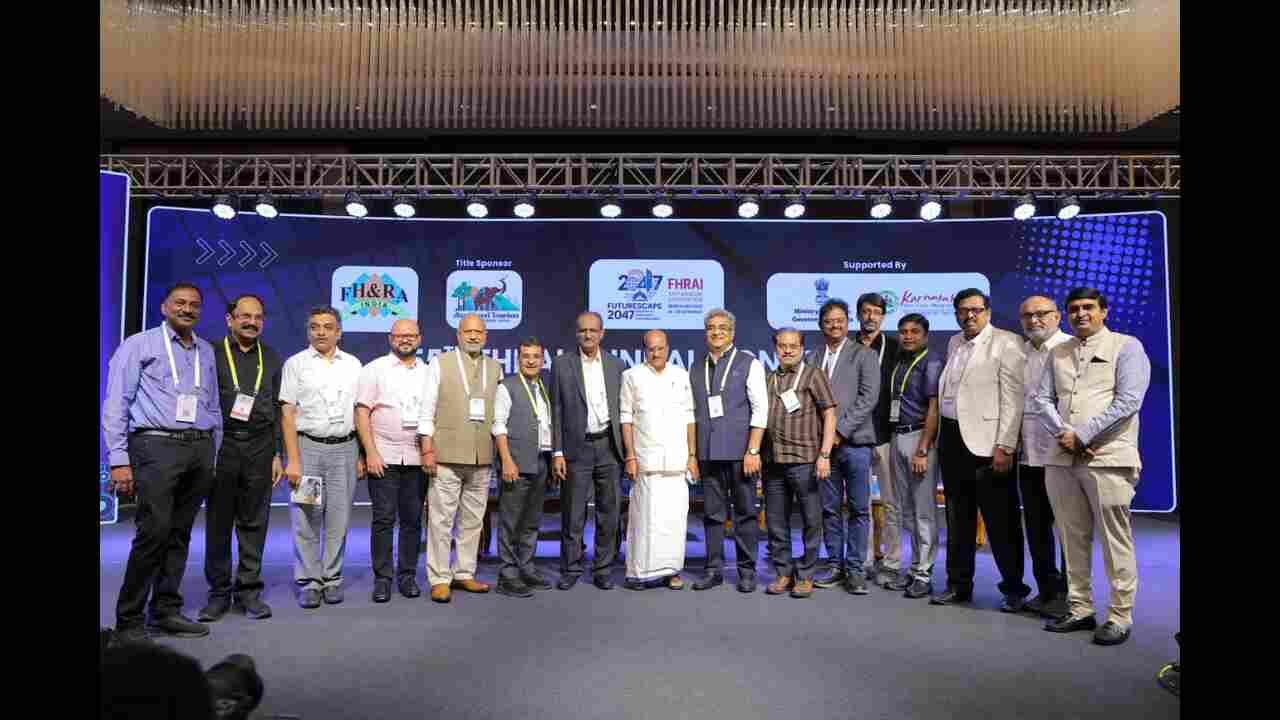India has always been known as the land of spirituality, culture, and heritage. With thousands of years of history, diverse traditions, and deep-rooted religious practices, the country attracts millions of tourists from across the globe. Over the past decade, the tourism landscape has undergone a transformation, with religious and spiritual tourism emerging as one of the strongest growth drivers. The numbers are staggering: Varanasi alone witnessed an astonishing 11 crore visitors in 2024, a figure that highlights the exponential rise of faith-based travel. At the same time, regions like Puducherry and Karnataka are leveraging heritage, hospitality, and wellness tourism to create a balanced ecosystem that appeals to both domestic and international travelers.
The 55th Annual Convention of the Federation of Hotels and Restaurants Association of India (FHRAI), held in Bengaluru on September 20, 2025, shed light on how different states and stakeholders are reshaping the future of tourism. From religious tourism and wellness initiatives to heritage conservation and Gen Z-driven hospitality demand, the convention showcased how India is positioned to become one of the leading global tourism destinations.
Puducherry’s Rising Global Recognition
Speaking at the convention, Puducherry’s Tourism Minister, Sri K. Lakshminarayanan, revealed that the Union Territory has been ranked the second-best place in the world for tourism as per a recent global report. This recognition is not accidental—it is the result of a conscious push by the Puducherry Government to strengthen infrastructure, create tourist-friendly policies, and tap into its unique blend of French colonial heritage, spirituality, and beachside appeal.
In 2024 alone, Puducherry welcomed nearly 19 lakh tourists, contributing close to ₹25,000 crores to the state’s economy. Lakshminarayanan emphasized that infrastructure development remains the government’s top priority to sustain this growth. Investments are being channeled into improving road connectivity, airport facilities, accommodation options, and cultural experiences that enhance the overall tourist journey.
By combining its heritage charm with modern amenities, Puducherry is evolving into a holistic destination where travelers can experience spirituality, leisure, and international-style hospitality.
Karnataka’s Heritage Wealth and Tourism Policy
Adding to the conversation, Dr. Rajendra, Director of Tourism, Government of Karnataka, highlighted the state’s immense tourism potential. Karnataka is home to over 25,000 historical and heritage sites, including four UNESCO World Heritage Sites and more than 800 notified sites of cultural and historical importance. From the ruins of Hampi to the architectural brilliance of Pattadakal, Karnataka offers an unparalleled glimpse into India’s glorious past.
In recognition of this treasure trove, the Karnataka government introduced a new Tourism Policy in 2025, with a clear emphasis on public-private partnerships (PPP). The goal is to integrate heritage preservation with economic development while simultaneously generating employment opportunities for local communities. By creating a collaborative ecosystem, the policy aims to position Karnataka not just as a domestic favorite but also as an international hub for heritage and cultural exploration.
The Surge of Religious and Spiritual Tourism
While heritage remains a cornerstone, religious tourism is experiencing unprecedented growth across India. Nowhere is this more evident than in Varanasi, the spiritual capital of the country, which recorded an extraordinary 11 crore visitors in 2024. Pilgrimage centers such as Ayodhya, Tirupati, Shirdi, and Puri are witnessing similar surges, underscoring the increasing demand for faith-driven travel experiences.
Sri Ganesh Pai of ISKCON, Bengaluru South, shed light on a fascinating trend: spiritual tourism today is no longer restricted to the elderly. Surprisingly, Gen Z travelers are driving much of this demand, with travel portals reporting that 80% to 90% of searches for tourist destinations are linked to religious places. Unlike traditional pilgrims, however, this younger demographic seeks to blend spirituality with adventure and cultural exploration. For instance, after visiting a temple or spiritual site, many Gen Z travelers also pursue activities like trekking, camping, or cultural immersion.
This changing profile of spiritual tourism reflects inclusivity and adaptability, making it one of the most dynamic segments of India’s travel sector.
Wellness Tourism: A Rising Complement to Spirituality
Alongside heritage and spirituality, wellness tourism has emerged as a crucial dimension of India’s tourism ecosystem. At the FHRAI convention, Dr. Jazzy Nepram, Director of CHI The Spa and Health Club at Shangri-La, highlighted the importance of skill development in this sector. According to her, property owners need to collaborate with skilled wellness professionals, including individual practitioners, to improve the quality of spa and wellness services.
India already enjoys a natural advantage in wellness tourism, thanks to its Ayurvedic heritage, yoga traditions, and holistic healing practices. However, scaling this sector requires professional training and modern service standards. By investing in capacity-building and professional expertise, the wellness sector could become a significant revenue contributor and complement India’s image as a spiritual and rejuvenation hub.
Gen Z: The Future of Hospitality Growth
One recurring theme across all discussions was the impact of Generation Z on the future of tourism and hospitality. Dr. Bhupesh Kumar, Principal-cum-Secretary of the Institute of Hotel Management Catering Technology and Applied Nutrition, Ranchi, stressed that Gen Z travelers are set to be the biggest growth drivers for the hospitality sector in the coming decade.
Unlike previous generations, Gen Z places a high value on personalized experiences, inclusivity, digital convenience, and sustainability. For the hospitality sector to succeed, tourism employers need to upgrade their skills and service standards to match the expectations of this tech-savvy and experience-driven demographic. From seamless digital check-ins to eco-friendly accommodations and curated adventure add-ons, catering to Gen Z requires innovation and adaptability.
Economic Impact and Employment Generation
Tourism in India is not just about cultural exchange or personal rejuvenation—it is also a powerful economic engine. With destinations like Varanasi, Puducherry, and Karnataka recording significant surges in arrivals, the tourism and hospitality sector is creating thousands of jobs and contributing massively to state and national economies.
For instance, Puducherry’s ₹25,000 crore contribution from tourism in 2024 highlights how deeply integrated the sector is with local livelihoods. Similarly, Karnataka’s heritage-driven initiatives are expected to generate sustainable employment while preserving the state’s cultural identity.
Religious tourism, with its sheer scale, is also acting as a force multiplier by boosting local businesses such as transport services, hotels, eateries, handicrafts, and cultural performances.
Conclusion: A Holistic Future for Indian Tourism
The discussions at the FHRAI convention made one fact clear: India’s tourism is no longer a one-dimensional story. It is a multi-layered ecosystem that thrives on the interplay of spirituality, heritage, wellness, and youth-driven adventure. The surge in religious tourism—illustrated by Varanasi’s record-breaking visitor numbers—is only one part of the story. Puducherry’s global recognition, Karnataka’s heritage wealth, the rise of wellness initiatives, and the demands of Gen Z together paint a picture of a vibrant, forward-looking sector.
As India continues to invest in infrastructure, skill development, and inclusive policies, the country is well on its way to becoming a global tourism leader. For travelers, this means a future where one can meditate on the ghats of Varanasi, explore the ruins of Hampi, rejuvenate with Ayurvedic therapies in Puducherry, and enjoy cutting-edge hospitality designed for the next generation—all within a single journey.



